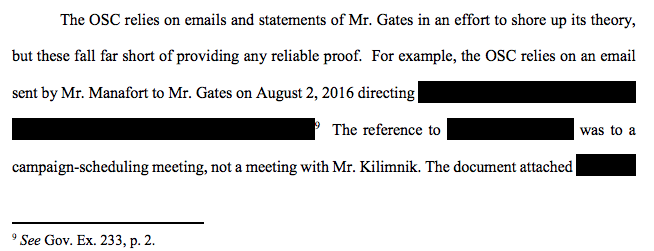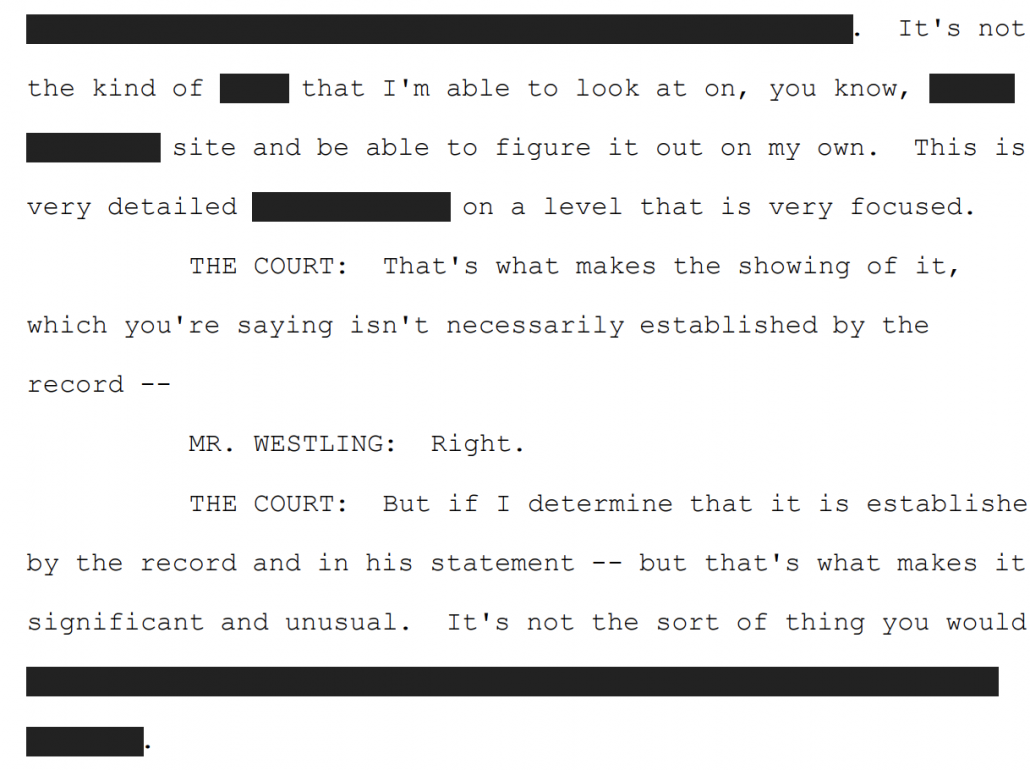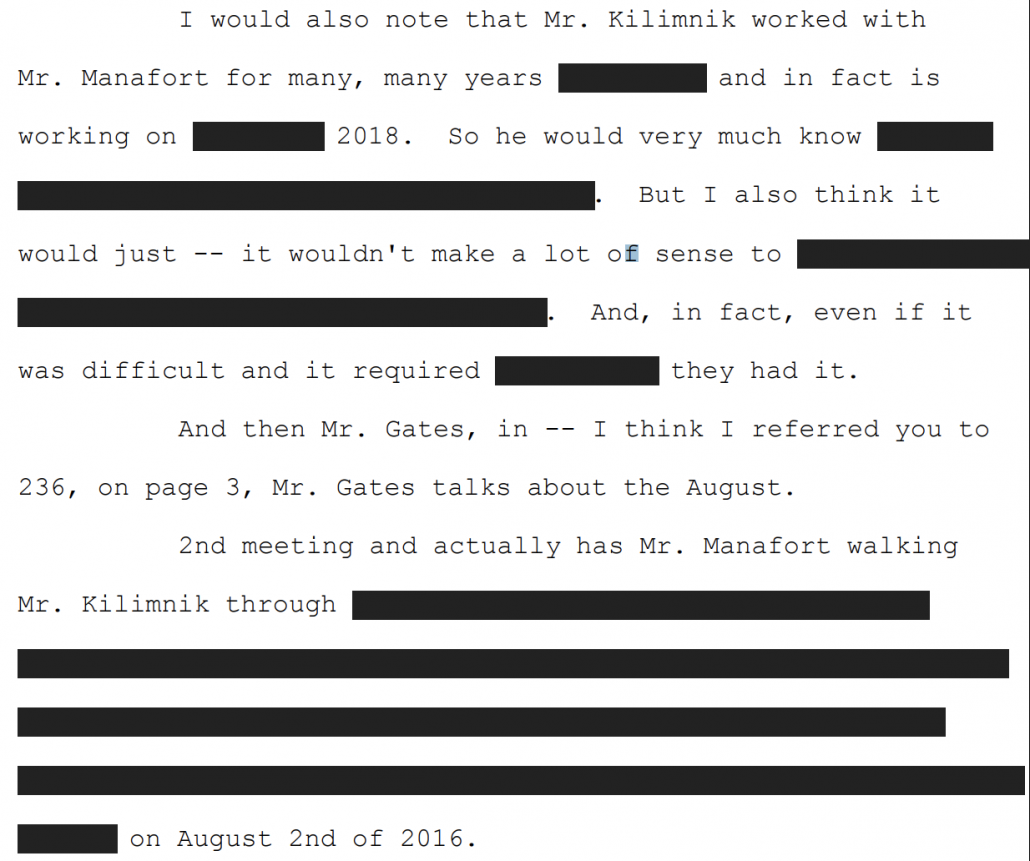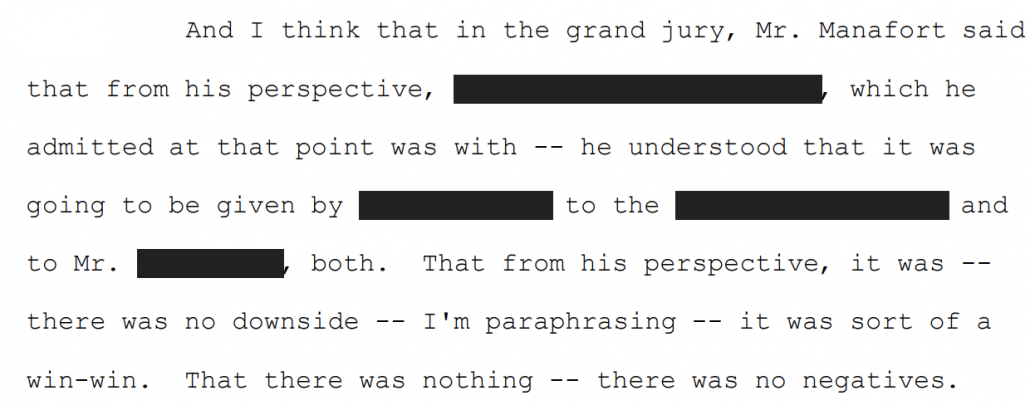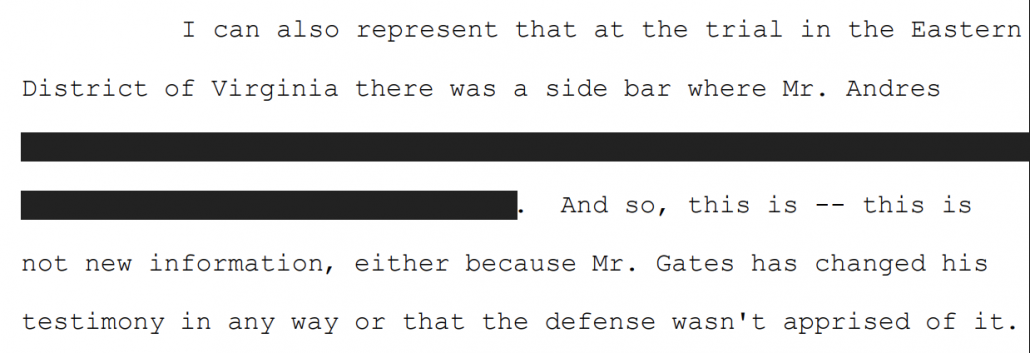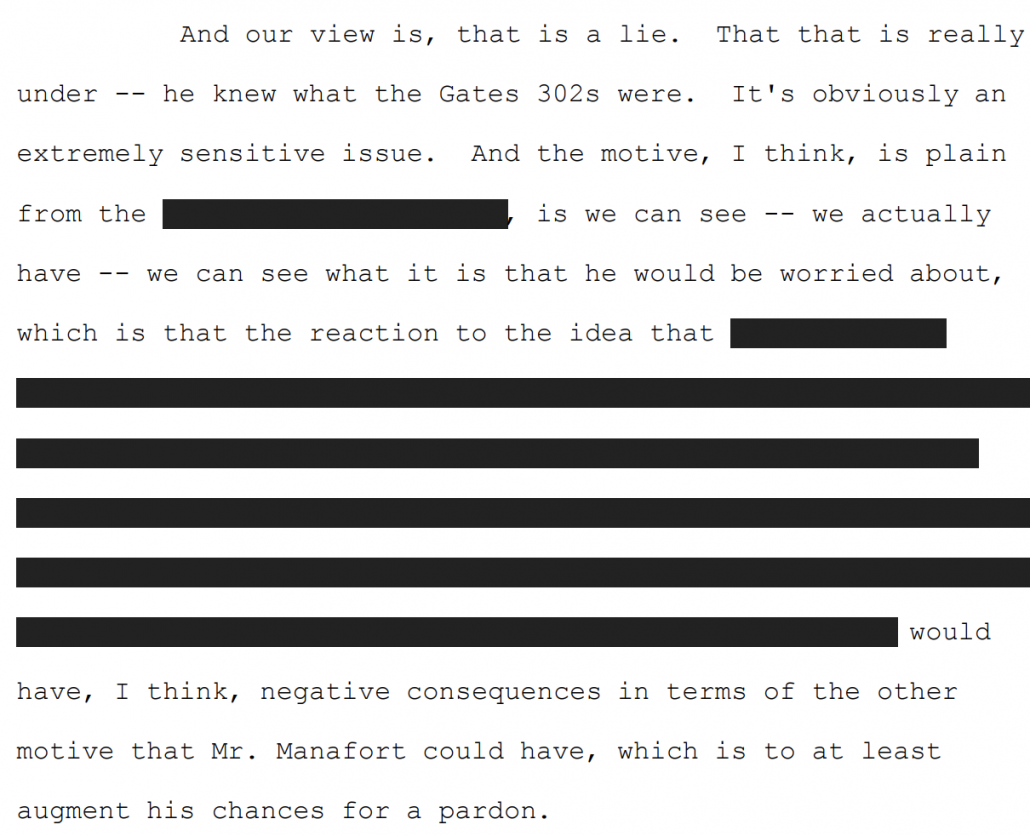As noted, yesterday Judge Amy Berman Jackson ruled that Mueller’s team had proven Paul Manafort lied in three of the five areas they accused him of lying about:
- The kickback scheme via which he got paid
- Meetings with Konstantin Kilimnik to share polling data and discuss a “peace” deal with Ukraine
- The role of a 7-character named person in an attempt to salvage Trump’s campaign being investigated in another district
The ruling is damning, and Manafort now may face what amounts to a life sentence (though, in her order ABJ noted that whether she’ll give him credit for acceptance of responsibility at sentencing depends “on a number of additional factors”).
Yet, in spite of the mounting evidence that Manafort shared polling data at a meeting where he also discussed a Ukrainian peace deal (a backdoor way of giving Russia sanctions relief), in spite of how damning this breach discussion has been, ABJ’s ruling is still just one step in an ongoing process.
I say that for several reasons that have to do with what we didn’t see as part of this breach determination.
We’re only seeing half of Manafort’s cooperation
First, we’re only seeing material relating to half of Manafort’s cooperation. In his declaration on the breach determination, FBI Agent Jeffrey Weiland described Manafort’s cooperation to include 14 sessions:
- 3 pre-plea proffer sessions: September 11, 12, and 13
- 9 debriefing sessions: September 20, 21, 25, 26, 27, October 1, October 5, October 11, and October 16
- 2 grand jury appearances: October 26 and November 2
If I’ve tracked everything properly, the descriptions of Manafort’s lies only include material from some of those sessions:
- 3 pre-plea proffer sessions: September 11, 12, and 13
- 5 debriefing sessions: September 20, 21, October 1, October 5, and October 16
- 1 grand jury appearance: October 26
That means there are three debriefing sessions and a grand jury appearance we haven’t heard anything about yet:
- 4 debriefing sessions: September 25, 26, 27, and October 11
- 1 grand jury appearance: November 2
In the breach hearing, Richard Westling claimed that the material we’ve seen constitutes just a “small set” of the topics covered in Manafort’s cooperation and he says some of the other topics were “more sensitive topics.”
WESTLING: And I think, you know, the last point that I would make is that given that relatively small set of areas where this occurred, whether even the allegations are being made, you know, we note that there’s not really a lot to explain. There’s no pattern, there’s no clear motive that would suggest someone who was trying to intentionally not share information. And many of the more sensitive topics that we’re aware of from a — all of us paying attention to what’s gone in the news cycle over the last many months, you know, are things where these issues didn’t come up, where there wasn’t a complaint about the information Mr. Manafort provided. And so we think that’s important context as we get started here today.
THE COURT: Do I have — and I don’t think I need them for today, but I’m certain that what you just said is also going to be a part of your acceptance of responsibility argument and argument at sentencing. Do I have the 302s from 12 days of interviews? Do I have everything, or do I only have what was given to me because it bore on the particular issues that I’m being asked to rule on today?
MR. WEISSMANN: Judge, you do not have everything. We are happy to give you the — all of the 302s. We just gave you — you have, I think, the majority of them, but not all of them.
THE COURT: Okay. And I don’t know that — if I need them. But, it’s hard to assess — and I certainly don’t think they should be a public part of any sentencing submission. But, if you want me to put this in context of more that was said, it helps to have it.
Now, it’s possible that Manafort did tell the truth about these more sensitive topics. It’s possible that (for example, with regards to Trump’s foreknowledge of the June 9 meeting), Manafort lied but prosecutors don’t have proof he did. Or it’s possible they know he lied about other issues but for investigative reasons, don’t want to share the proof they know he lied.
One of the other topics Manafort would have been asked about — which Westling’s reference to “what’s gone in the news cycle over the last many months” may reference — pertains to Roger Stone’s actions.
ABJ asked for — and presumably has or will obtain — the rest of the 302s from Manafort’s cooperation, so she may end up agreeing with Manafort’s lawyers that some of his cooperation was quite valuable.
Mueller was interested in Manafort’s cooperation, in part, to obtain intelligence
As I’ve noted before, Andrew Weissmann described Manafort’s cooperation to be somewhat unusual for the extent to which Mueller was seeking intelligence, rather than criminal evidence. Though he makes clear that that was true, as well, of Rick Gates’ early cooperation.
[T]here’s enormous interest in what I will call — for lack of a better term — the intelligence that could be gathered from having a cooperating witness in this particular investigation
[snip]
And with Mr. Gates, we also wanted to make sure that we could get information, and we thought that there was — I think there was certainly a significant issue. And we dealt with it by having the defendant plead to something in addition to take — to have the ramification for it. But that is to show, I think, an example of wanting the intelligence, but dealing with what we considered to be, you know, unacceptable behavior from the Government, particularly from somebody whose information we would rely on, and potentially ask the jury to rely on.
So we may never see a great deal of what Manafort was asked about.
Mueller is still protecting an ongoing investigation
That said, Mueller is still protecting both his and the other DOJ ongoing investigation. We know what Mueller is protecting from the redactions in the transcript.
ABJ noted that much of what they discussed at the breach hearing could be unsealed, while noting that Mueller felt more strongly about keeping some things secret.
I think a large portion of what we discussed could be public. I think there are certain issues where you probably only need to redact out names and turn them back into entities. And then there are may be one or two issues where we’re really talking about something that was completely redacted at every point prior to this and will continue to be. And, hopefully, you’ll both be on the same page about that with respect to what of the investigation is not yet public. I think the Office of Special Counsel has the stronger point of view about that.
Certainly, all the names had to be redacted, under DOJ guidelines prohibiting the publication of anyone’s name who has not been charged. Likewise, the other investigation is not Mueller’s to reveal (in any case, it seems to be still active, even if Manafort’s refusal to cooperate may have protected the target of it).
But more of the rest of the discussion could have been unsealed if Mueller didn’t have ongoing interests in the topics. Those topics include Manafort’s ongoing communications with the Administration, Ukrainian peace deal/sanctions relief, and his sharing of polling data (though there’s one reference to sharing polling data on page 19 that may have gotten missed by the censors). Mueller redacted those things even though Weissmann makes clear that they believe the polling data goes to the core of what they are investigating.
MR. WEISSMANN: So — so, first, in terms of the what it is that the special counsel is tasked with doing, as the Court knows from having that case litigated before you, is that there are different aspects to what we have to look at, and one is Russian efforts to interfere with the election, and the other is contacts, witting or unwitting, by Americans with Russia, and then whether there was — those contacts were more intentional or not. And for us, the issue of [2 lines redacted] is in the core of what it is that the special counsel is supposed to be investigating.
Note his use of the present progressive. They’re still trying to answer the question about whether that August 2 amounts to witting conspiracy with Russia.
Mueller is still sitting on information about the shared polling data
It may well be that, given Manafort’s refusal to cooperate on this issue, Mueller will never be able to charge Trump’s campaign for sharing polling data with Russia in the context of sanctions relief.
But they are sitting on more information than came out publicly in this breach discussion. Starting on page 93 of the transcript, ABJ, on her own, brings up other information she has seen, that pertains to the topic.
THE COURT: I need to ask the Office of Special Counsel about something ex parte because — and so I apologize for that, but I need to do that. And it may be after I talk to them, they tell me there’s no problem with sharing it with you. But I have received information in this case, in this binder, and in other means, and I just want to make sure I understand something. And so, I can’t — I need to ask —
MR. DOWNING: We would object. But we don’t know he —
THE COURT: I note your objection. And I will deem your objection also to be a request that what we’re about to discuss be revealed to you. And that will be the first thing I’m going to ask. And we can do it at the end, after we’re done, or you can just have him come to the bench for a minute.
The ex parte discussion on this topic is fairly short. But after the lunch break, Weissmann tells ABJ that the material she was thinking of remains redacted. But he does point her to two Gates 302s from early in his cooperation that seem to provide some of the same information.
THE COURT: All right. Let me start with you, Mr. Weissmann. Is there anything further you can add to what we talked about, that you can add publicly?
MR. WEISSMANN: Yes. Yes, Your Honor. So, we haven’t finished our review, but we believe that the material that you asked about was redacted.
THE COURT: Okay.
MR. WEISSMANN: However, I would like to direct your attention to two exhibits in the record. If you recall, I mentioned that I recalled that Mr. Gates had, very early on in his cooperation, given us information about [redacted]. And there are two 302s that are dated in, I believe, both in January of 2018. So before he actually pled guilty, so in connection with his proffers. So, the first one is Exhibit 222. And if you look at page 17 of that exhibit, there’s a long explanation of communications with [redacted] that refer to [redacted] at the direction of Mr. Manafort. And then if you look — and that is dated January 31st, 2018. And that was, of course, provided to counsel in connection with the Eastern District of Virginia trial. And Exhibit 236, and I believe I referred you previously to page 3, and I would also refer you to page 5. Both of those refer to [redacted] and also refer to the discussions of the — discussions of [redacted] at the August 2nd, 2016 meeting.
THE COURT: All right. I will look at all of that. So for right now, I’m going to leave the little conversation that we had ex parte, ex parte with your objection noted.
MR. WEISSMANN: Judge, we will continue to look to see if there is any portion that was unredacted to confirm that.
Given the issues she has presided over, this may pertain to one of the search warrant affidavits that Manafort tried to get completely unsealed last year, but which ABJ suggested pertained to other people.
In any case, there’s more on the sharing of polling data that ABJ knows about, this is relevant to its importance, but that does not appear in the unsealed transcript.
Mueller didn’t reveal all the evidence of Manafort’s attempts to contact the Administration
Finally, there appear to be communications between Manafort and Administration officials that Mueller did not release as part of this process. The government stated that clearly in a footnote (on page 27) of its breach declaration.
This is not a complete listing of such contacts Manafort had with Administration officials. Further, for the purpose of proving the falsity of Manafort’s assertions in this section, the government is not relying on communications that may have taken place, with Manafort’s consent, through his legal counsel.
And, in a bid to refute Manafort’s claim, in the redaction fail filing, that, “Mr. Manafort was well aware that the Special Counsel’s attorneys and investigators had scrutinized all of his electronic communications” because “Mr. Manafort voluntarily produced numerous electronic devices and passwords at the request of the Government,” Agent Weiland states that the FBI had found more than 10 devices or documents for which Manafort hadn’t shared a password.
Defendant said in his pleading that he has provided electronic to the government. However, although he has provided some electronic data, passwords, and documents, in more than ten instances he did not provide passwords to access his electronic communications, thumb drives, or documents.
Mueller’s team remains coy about how many of those 10 accounts, thumb drives, or documents they’ve been able to access without his assistance.
And Greg Andres provides some hints about what those other conversations involve: Manafort providing information about the investigation.
MR. ANDRES: Sure. Judge, throughout the interviews with Mr. Manafort and some of the issues we’ve discussed today, you see that he constantly either minimizes the information he has about the administration or any contact with the administration. So there’s an issue whether or not during his cooperation he’s communicating with [15 character redaction] or providing information about the questions or other things that are happening in the special counsel investigation, whether he’s sharing that with other people. And this is another example of Mr. Manafort —
THE COURT: That hasn’t been given to me as we’re troubled by this or he wasn’t truthful about that, so I don’t see how to put this in the context of that because I don’t know about that.
MR. ANDRES: Well, so for example, in the No. 4, the one that Mr. Manafort — that Mr. Weissmann just talked about with respect to the [redacted, other investigation], you see Mr. Manafort changing his story so as not to implicate either [redacted] or someone in [redacted]. I think, with respect to this issue, again, Mr. Manafort is trying to distance himself from the administration and saying he’s not having contact with the administration at a time when he’s under at least one indictment.
THE COURT: But you’re not suggesting right now that there’s more information in here about other efforts to distance himself from the administration or to deny a relationship or to deny reporting back to them?
MR. ANDRES: We’re not relying on any other evidence of that issue.
Particularly given that Manafort, between his early September proffers and his October 5 lies about the other investigation, managed to match his own testimony to that of the Trump associate being targeted in it, those communications may even date as recently as last fall (though that would mean he was communicating with the Administration from jail).
The fact that Mueller has other communications between Manafort and the Administration — but chose not to bolster their argument that Manafort lied about ongoing communications with the White House — suggests protecting what he wants to do with those communications is more valuable than convincing ABJ that Manafort lied about this topic (and, indeed, this is one of the two topics where she did not rule for the government).
For all the debate about whether Mueller is almost done or not, the things we didn’t learn about during this breach discussion are just as interesting as the things we did learn about. They suggest that all the discussion about cooperation deals (including my own) often forgets that Mueller is seeking both criminal evidence and intelligence on what the Russians were doing. They also suggest that Manafort may have provided testimony that bears on other parts of the investigation we’ve recently learned about (which might include Stone, or the Trump Tower deal) — but we can’t be sure whether Manafort told the truth, or whether he lied but Mueller either can’t prove or doesn’t want to reveal that he knows Manafort lied. They suggest that Mueller would still like to make the case, in whatever form, that Manafort intentionally gave the Russians polling data with the understanding that he’d push a Ukrainian peace deal that amounted to sanctions relief — but Manafort’s refusal to cooperate on this point might thwart that effort. Finally, they make it clear that Manafort remained a part of an effort to obstruct this investigation, including via means that bypassed the Joint Defense Agreement Trump has exploited.
As I disclosed last July, I provided information to the FBI on issues related to the Mueller investigation, so I’m going to include disclosure statements on Mueller investigation posts from here on out. I will include the disclosure whether or not the stuff I shared with the FBI pertains to the subject of the post.


